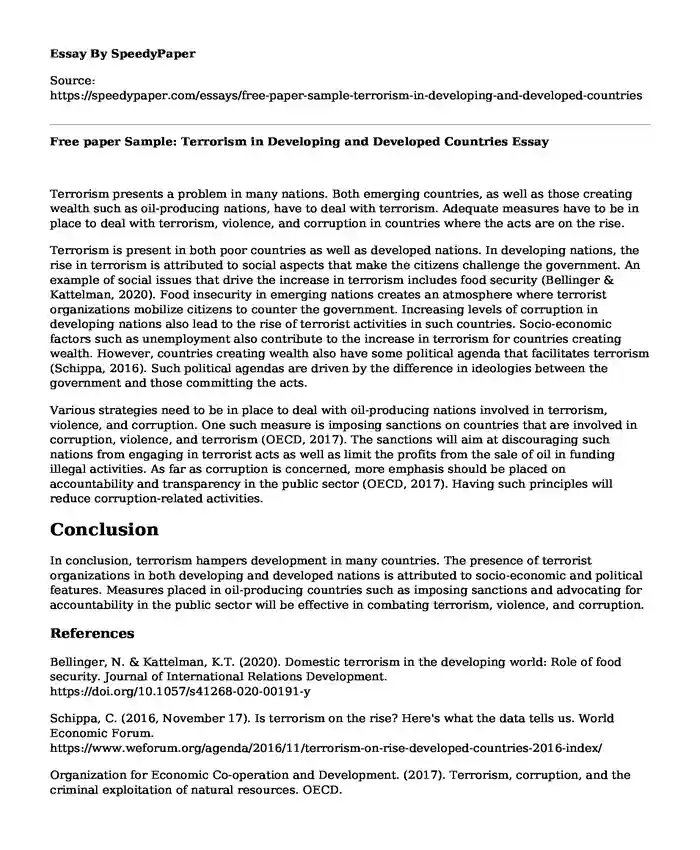Terrorism presents a problem in many nations. Both emerging countries, as well as those creating wealth such as oil-producing nations, have to deal with terrorism. Adequate measures have to be in place to deal with terrorism, violence, and corruption in countries where the acts are on the rise.
Terrorism is present in both poor countries as well as developed nations. In developing nations, the rise in terrorism is attributed to social aspects that make the citizens challenge the government. An example of social issues that drive the increase in terrorism includes food security (Bellinger & Kattelman, 2020). Food insecurity in emerging nations creates an atmosphere where terrorist organizations mobilize citizens to counter the government. Increasing levels of corruption in developing nations also lead to the rise of terrorist activities in such countries. Socio-economic factors such as unemployment also contribute to the increase in terrorism for countries creating wealth. However, countries creating wealth also have some political agenda that facilitates terrorism (Schippa, 2016). Such political agendas are driven by the difference in ideologies between the government and those committing the acts.
Various strategies need to be in place to deal with oil-producing nations involved in terrorism, violence, and corruption. One such measure is imposing sanctions on countries that are involved in corruption, violence, and terrorism (OECD, 2017). The sanctions will aim at discouraging such nations from engaging in terrorist acts as well as limit the profits from the sale of oil in funding illegal activities. As far as corruption is concerned, more emphasis should be placed on accountability and transparency in the public sector (OECD, 2017). Having such principles will reduce corruption-related activities.
Conclusion
In conclusion, terrorism hampers development in many countries. The presence of terrorist organizations in both developing and developed nations is attributed to socio-economic and political features. Measures placed in oil-producing countries such as imposing sanctions and advocating for accountability in the public sector will be effective in combating terrorism, violence, and corruption.
References
Bellinger, N. & Kattelman, K.T. (2020). Domestic terrorism in the developing world: Role of food security. Journal of International Relations Development. https://doi.org/10.1057/s41268-020-00191-y
Schippa, C. (2016, November 17). Is terrorism on the rise? Here's what the data tells us. World Economic Forum. https://www.weforum.org/agenda/2016/11/terrorism-on-rise-developed-countries-2016-index/
Organization for Economic Co-operation and Development. (2017). Terrorism, corruption, and the criminal exploitation of natural resources. OECD. https://www.oecd.org/investment/Terrorism-corruption-criminal-exploitation-natural-resources-2017.pdf
Cite this page
Free paper Sample: Terrorism in Developing and Developed Countries. (2023, Nov 08). Retrieved from https://speedypaper.com/essays/free-paper-sample-terrorism-in-developing-and-developed-countries
Request Removal
If you are the original author of this essay and no longer wish to have it published on the SpeedyPaper website, please click below to request its removal:
- Free Essay: Manufacturing Sector is Expected to Lose More Workers
- Free Essay Sample: A World of Diversity
- Essay Sample about Slavery and the American Revolution
- Free Essay Sample on The Environment Impacts of Factory Farming
- Essay Sample on Problems Historically Faced by Women
- Recognize & Appreciate Employees for Improved Performance & Retention - Essay Sample
- Essay Sample on Beatles Social Issue
Popular categories





